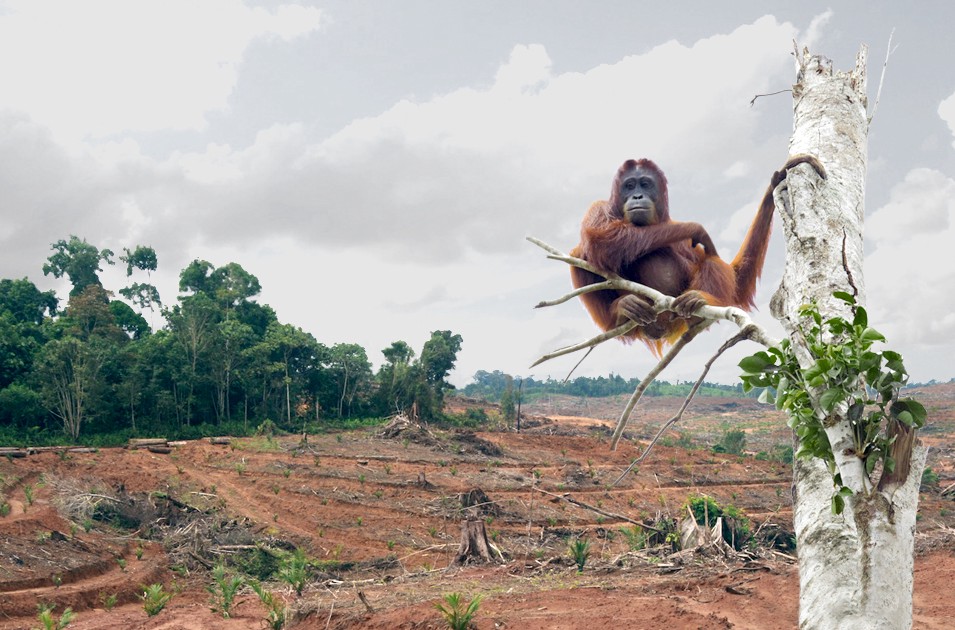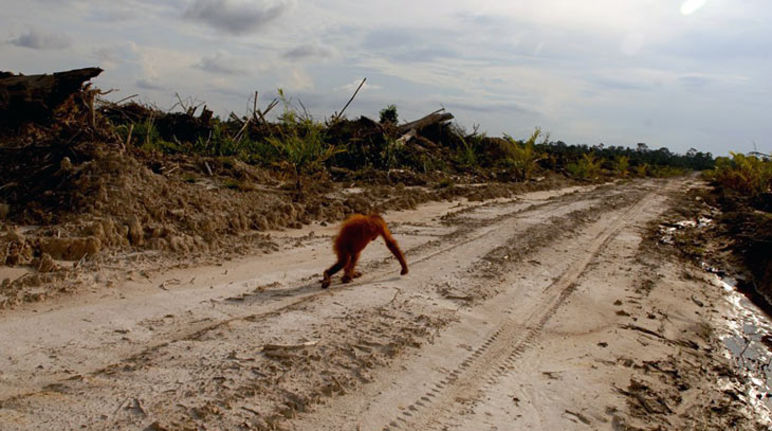Picture orangutans swinging, lush forests swaying, and blue skies for days. Then…
BAM. Enter: machinery, machetes, bulldozers, and humans.
Not a pretty site. This is the imagery we think of when it comes to a resource we detest, but eat daily: palm oil.
The quickest way to confuse yourself and time waste, is to google palm oil on the internet. The controversy around its impact on the planet, people, and animals is huge. Is it good, or is it bad?
If palm oil had a Facebook page, it’s relationship status would be: it’s complicated.

What is palm oil?
Palm oil is a vegetable oil extracted from the palm fruit, which grows on the African Oil Palm in Western Africa, Asia, North and South America, Indonesia and Malaysia.
The reason it’s such a huge topic, is because it’s like Adam Sandler in comedy movies. It’s in everything.
Ice cream, shampoo, detergent, potato chips, lipstick, and bread; most of the products we use daily contain palm oil. Palm oil is used to make lipstick hold its colour and keep its shape in the heat, aid shampoos in helping to restore the natural oils of our hair, and to make ice cream smooth, creamy, and delicious.
It’s one of the most useful oils in society today. Yet, it’s mass production is destroying ecosystems and impacting the world in a drastic way.
Environmental damage
When it comes to the devastating damage of palm oil production, it’s hard to know where to start.
Firstly, to grow oil palms, forestry is cleared. World Wildlife Fund (WWF) estimates around 300 football fields of forest are cleared every hour to make way for palm oil plantations. Forest fires over bogs, a common occurrence, result in greenhouse gases being released in mammoth amounts, and soil erosion from planting oil palms on steep slopes, results in increased flooding and silt deposits in water ways.

Image Via Rainforest Rescue
Wildlife destruction
Unsurprisingly, clearing forestry leads to massive up hauls of ecosystems inhabiting the forests.
Animals, including orangutans and elephants, are forced out of their homes, as the forests are bulldozed or burnt out. The animals are simply viewed as pests, standing in the way of profit. Workers are told to do whatever it takes to remove them. Stoning, burning, and poisoning methods are implemented to speed up the process.
Killing the animals ensures they won’t vacate to another part of the forest and become another problem in the future.
Social issues
The damage doesn’t stop there. Indigenous cultures are also displaced from their homelands when they don’t own the legal titles of the land. These groups, who lived on their land for centuries, are left with nowhere to go. Unfortunately, they’re not the only ones in crisis. Palm oil plantation workers face horrific working conditions, children are enslaved, surrounding societies are affected by the air pollution from forest fires, and the contamination of fertilisers and pesticides in their water sources. It appears no one is left unaffected.
Between the environmental devastation, endangerment of species, and all social issues involved with palm oil production, you’d think the answer would be to boycott palm oil all together. But it’s not that simple.
We shouldn’t boycott palm oil. There’s a better solution.

Image via WWF
If we were to cut out palm oil completely, the results would be catastrophic
Uprooting an industry so huge would disrupt whole economies and livelihoods. Alternatives to palm oil, like rape seed and soy, could also be even more destructive and unsustainable. Removing palm oil would only promote the use of these other oils, and create issues that may be even worse for the environment.
The answer is not to remove it from our lives, but support sustainable palm oil production.
Sustainable palm oil
Sustainable palm oil allows businesses to thrive whilst incorporating the protection and respect of people and the planet.
WWF are the driving force behind sustainable palm oil production. In 2004, they established a group called the Roundtable on Sustainable Palm Oil. They’ve since created a RSPO certification which can be found on certified sustainable palm oil products.
The certification ensures:
- Fair working conditions for all workers involved
- Indigenous people and land are respected and protected
- Primary forests are not cleared
- Protection of wildlife
- Reduction of greenhouse gases
- Pollution is minimised
Palm oil is hidden in our foods under a variety of names, to hide the truth from consumers.
The truth is sickening.
But by increasing consumer demand for sustainably certified palm oil, rather than avoiding it, we can shift the way this popular oil is produced, and support an industry that allows the environment and people to thrive.
There’s no doubt the issue is huge, but we have the power to change it.


